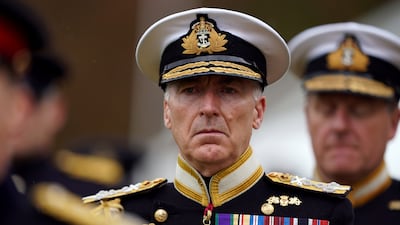The world is a more dangerous place and is now in a new nuclear age, UK armed forces chief Admiral Sir Tony Radakin warned on Wednesday.
He expressed his views on the current state of warfare during a speech at the Royal United Services Institute think tank, saying the UK faces challenges from a conflict in the Middle East that has spread beyond Gaza, as well as more than 1,000 days of war in Europe, with Russia and Ukraine locked in intense battles.
Admiral Radakin also called for reform to help strengthen UK defences. The country has the capacity, structures and time to tackle these challenges, he added.
New era
A shift in global power and the dawn of a new nuclear age are among the biggest challenges, while confidence, self belief, leadership, willingness to act and military reform are the best ways to overcome them, he said.
As thousands of North Korean soldiers gather at the Ukraine border and Russia uses Iran-supplied drones, amid report that Moscow could help to arm Yemen's Houthi rebels in retaliation for western support to Kyiv, Admiral Radakin believes the world can be divided into three groups.
These include authoritarian states seeking to challenge global rules, as well as responsible nations, including Gulf states, that are committed to world stability and security. "The third group of countries are hedging and ducking between the two for maximum advantage," he said.
Global response
Admiral Radakin said the Strategic Defence Review under way in the UK will assess what is required to respond to worldwide challenges, with the UK government aiming to raise defence spending to 2.5 per cent of GDP. He added that history shows the cost of defence and deterrence is always less than the costs that flow from instability and conflict.
"Defence investment delivers a perpetual return through wider governmental and societal value, by creating jobs and apprenticeships, underpinning strategic industries and exports, and fostering social mobility and cohesion at home," Admiral Radakin said.
He described the main British military successes of the year as the operation that used ships to help British citizens leave Lebanon amid Israel's war on the country, jets carrying out strikes on Houthi targets in Yemen and Royal Navy destroyers shooting down missiles and drones in the Red Sea. Admiral Radakin also praised operation against ISIS in Iraq and Syria, which began in 2014.
But he said "security is more than just territorial defence – it’s about safeguarding and strengthening our prosperity, it’s about protecting our interests and values and our way of life, and it's about contributing to the stability of the international system in the broadest sense".
Defence reform
Admiral Radakin believes the British military is still too slow, too cautious and too risk adverse. "There is still too much hierarchy and process, too much duplication and not enough prioritisation," he added.
He acknowledged that the war in Ukraine and the crisis in the Middle East have dominated the agenda. "But it is precisely because of the security outlook that the case for reform is even stronger today," he said.
"We live in a world where Houthi insurgents can hold global maritime trade at risk with minimal resources. These disruptive threats demand a disruptive response. But that requires us to overcome the organisational inertia and bias to the status quo that pervades much of our system."
He said the country had "always sought to achieve a competitive advantage through a blend of human and technological overmatch – or, in other words, our edge". He called for the British military to be "obsessed with making the nation secure at home and strong abroad".
Admiral Radakin criticised how Russia was fighting the war in Ukraine and assessed Israel's response to the threat from Iran, after the countries traded attacks. "I won’t go into detail, but in October’s retaliatory strikes again Iran, Israel used more than 100 aircraft, carrying fewer than 100 munitions, and with no aircraft getting within 100 miles of the target in the first wave, and that took nearly the entirety of Iran’s air defence system," he said.
"It has destroyed Iran’s ability to produce ballistic missiles for a year and left Tehran with a strategic dilemma in how it responds. That is the power of fifth-generation aircraft, combined with exquisite targeting and extraordinary intelligence, all delivered from a single sortie."
Admiral Radakin compared the Israeli action to the war in Europe, with Russia's air force now rarely flying over Ukraine. Moscow also uses crude glide bombs to devastating effect, but without creating nearly the same strategic and operational dilemmas, he said.
He said Nato had the edge over Russia in every domain, except nuclear. The accession of Finland and Sweden, and increased defence spending by countries including Poland and Germany, will extend Nato's advantages further, he added. But he warned that, as the alliance expands, it could lose the sort of agility and innovation that is an advantage for the west.


